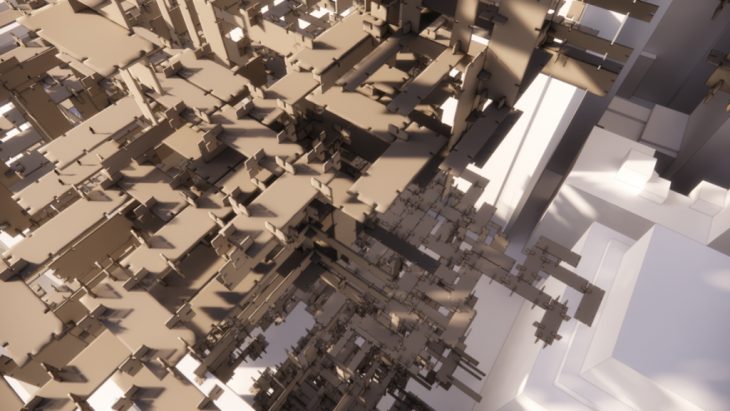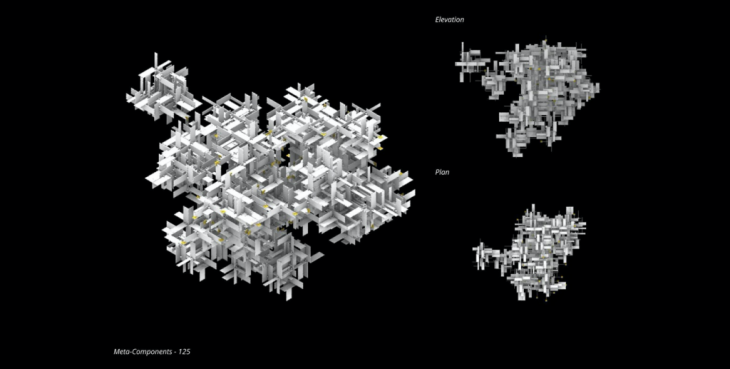ADVANCED ALGORITHMIC DESIGN STRATEGIES
Architectural Machines
Faculty: Alessio Erioli & Andrea Graziano
 Image Credits: Bloc Party by Zackary Bryson, Bruno Ganem Coutinho, Ileana Mariam Napier, Hunter Paine.
Image Credits: Bloc Party by Zackary Bryson, Bruno Ganem Coutinho, Ileana Mariam Napier, Hunter Paine.
Faculty: Alessio Erioli & Andrea Graziano
This seminar will focus on assembly/growth processes, investigated through iterative algorithmic strategies, and applied to an urban-block size architecture starting from elementary spatial building blocks. The building blocks used will be treated as basic units of computation, able to store and compute data due to their topological and spatio-geometric qualities. Growing assemblies of these elementary, generic components, create assemblages/networks whose emergent properties and constraints at intermediate and global scale define novel computational entities and conditions, which in turn fold back with feedback implications on the design of both the component geometry/topology and their rules of engagement.
The algorithmic process starts from the definition of the basic components as computational building blocks, their embedded/encoded properties and constraints, their growth protocols, and the information environment within which they interact. As a result, coherent spatio-geometric assemblages and topological data networks emerge simultaneously during the growth process. Their organizational structure can work as a computational matrix for agent-based system (such as stigmergy-based strategies), revealing them as computing devices to store, elaborate, and redistribute information, generating larger patterns and triggering change at the local level. Assemblages are affected by both endogenous (internal to the system such as procedures and criteria encoded into the basic components) and exogenous (external to the system such as a pervasive data field or a localized external boundary, whether physical – such as a wall – or semantic – such as a normative limit – in nature) factors.
The seminar will explore the dual geometric/topological computing nature of spatial systems, from basic iterative logics explored through Grasshopper and the Anemone plug-in, to more sophisticated network-based and topology-based stigmergic strategies using both standard and bespoke components.
Learning Objectives
At course completion the student will:
- Learn algorithmic strategies to approach building and urban block architectural design explorations;
- Learn how to use iterative tools and to manage data structure complexity;
- Be able to encode/decode data into/from geometry and exploit its spatial-topological structure to support design strategies;
- Be able to productively mobilize iterative, non-linear strategies for the design of an architectural project at the urban block scale.
 Image Credits: Bloc Party by Zackary Bryson, Bruno Ganem Coutinho, Ileana Mariam Napier, Hunter Paine.
Image Credits: Bloc Party by Zackary Bryson, Bruno Ganem Coutinho, Ileana Mariam Napier, Hunter Paine.
Faculty: Alessio Erioli & Andrea Graziano
Faculty

Alessio Erioli Engineer and Senior Researcher/Aggregated Professor at Università di Bologna (where he also teaches Architectural Design), MArch in Biodigital Architecture, PhD in Architectural Engineering, co-founder and coder at Co-de-iT (www.co-de-it.com). Advisor of 50+ Master Thesis in Engineering and Architecture; he has lectured and/or taught at (among others) IaaC (Barcelona), École des Ponts ParisTech, AA Visiting school (Paris, Dubai, Miami), ICD Stuttgart, TU Innsbruck, KTH Stockholm, Accademia Belle Arti Bologna. His interests regard the aesthetics and tectonics that emerge as a consequence of computation in architecture (and related fields), focusing on autonomy/intelligence/agency in the design process, and their materialization via programmable constructor agents. He is also skilled in computational design & 3D modelling on several platforms, with a preference for Rhinoceros, Grasshopper, C#, Java/Processing.

Andrea Graziano is an architect and computational designer, member and co-founder of Co-de-iT – Computational Design Italy, currently engaged in teaching international workshops about computational design, digital tools and robotic fabrication in architectural design, lecturing and consultancy work. Andrea is member and co-founder of STEAM+Lab (former digifabTURINg), a research cluster focused on digital fabrication, computation, robotics and material research applied in the field of architecture, design & art. Andrea acts as an active catalyst through his intense activity of social networking of the paradigm-shift in the fields of architectural research, computation and science. A ‘digital explorer’ and ‘knowmad’ aiming to research, curate and envision the rapid evolution of science, technology, art and philosophy, their possible convergence and tooling into design and architecture.
http://www.co-de-it.com